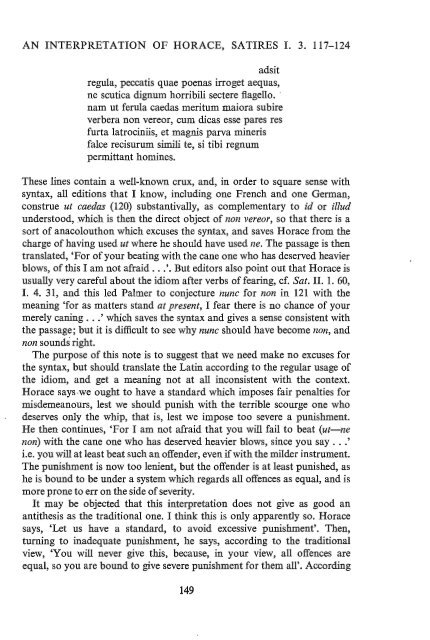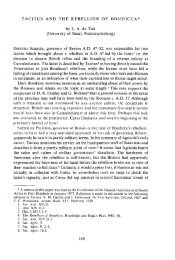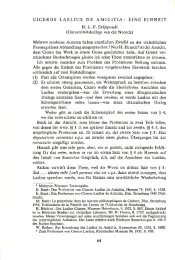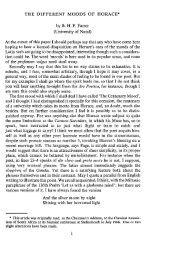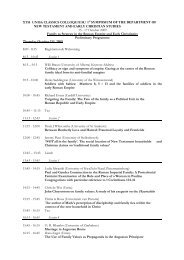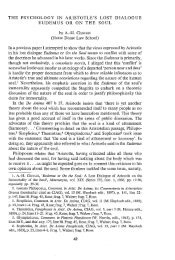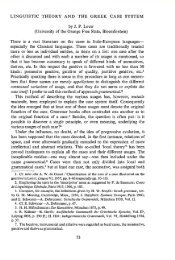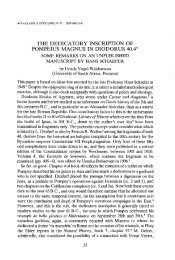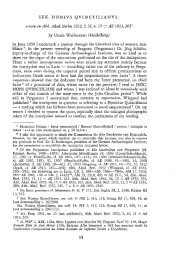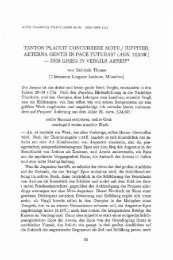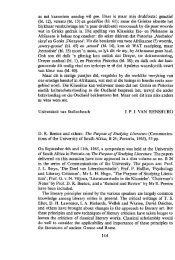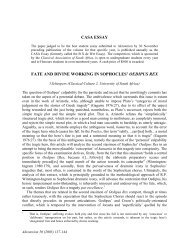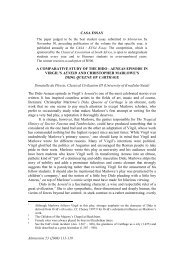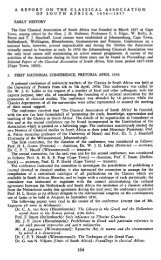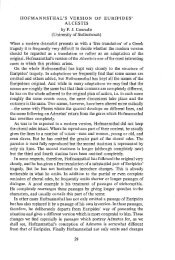AN INTERPRETATION OF HORACE, SATIRES I. 3. 117-124 adsit ...
AN INTERPRETATION OF HORACE, SATIRES I. 3. 117-124 adsit ...
AN INTERPRETATION OF HORACE, SATIRES I. 3. 117-124 adsit ...
You also want an ePaper? Increase the reach of your titles
YUMPU automatically turns print PDFs into web optimized ePapers that Google loves.
<strong>AN</strong> <strong>INTERPRETATION</strong> <strong>OF</strong> <strong>HORACE</strong>, <strong>SATIRES</strong> I. <strong>3.</strong> <strong>117</strong>-<strong>124</strong><strong>adsit</strong>regula, peccatis quae poenas irroget aequas,ne scutica dignum horribili sectere flagella. ·nam ut ferula caedas meritum maiora subireverbera non vereor, cum dicas esse pares resfurta latrociniis, et magnis parva minerisfalce recisurum simili te, si tibi regnumpermittant homines.These lines contain a well-known crux, and, in order to square sense withsyntax, all editions that I know, including one French and one German,construe ut caedas (120) substantivally, as complementary to id or illudlmderstood, which is then the direct object of non vereor, so that there is asort of anacolouthon which excuses the syntax, and saves Horace from thecharge of having used ut where he should have used ne. The passage is thentranslated, 'For of your beating with the cane one who has deserved heavierblows, of this I am not afraid ... '. But editors also point out that Horace isusually very careful about the idiom after verbs of fearing, cf. Sat. II. 1. 60,I. 4. 31, and this led Palmer to conjecture 1nmc for non in 121 with themeaning 'for as matters stand at present, I fear there is no chance of yourmerely caning .. .' which saves the syntax and gives a sense consistent withthe passage; but it is difficult to see why nunc should have become non, andnon sounds right.The purpose of this note is to suggest that we need make no excuses forthe syntax, but should translate the Latin according to the regular usage ofthe idiom, and get a meaning not at all inconsistent with the context.Horace says we ought to have a standard which imposes fair penalties formisdemeanours, lest we should punish with the terrible scourge one whodeserves only the whip, that is, lest we impose too severe a punishment.He then continues, 'For I am not afraid that you will fail to beat (ut-nenon) with the cane one who has deserved heavier blows, since you say .. .'i.e. you will at least beat such an offender, even if with the milder instrument.The punishment is now too lenient, but the offender is at least punished, ashe is bound to be under a system which regards all offences as equal, and ismore prone to err on the side of severity.It may be objected that this interpretation does not give as good anantithesis as the traditional one. I think this is only apparently so. Horacesays, 'Let us have a standard, to avoid excessive punishment'. Then,turning to inadequate punishment, he says, according to the traditionalview, 'You will never give this, because, in your view, all offences areequal, so you are bound to give severe punishment for them all'. According149
to the interpretation put forward here he says, 'I am more concerned withthe danger of excessive punishment than with its opposite because, withyour stern views, you are bound at least to punish the culprit, even ifinadequately'. I think Horace may also be thinking less about the contrastbetween excessive and inadequate punishment than about the gradation ofthe instruments flagellum, scutica, Jerula. Juvenal (VI 479) mentions thethree together, as Palmer points out.If the traditional interpretation is to be retained, as giving the bettersense, then I suggest Horace may have written nam Jerula caedas, withomission of ne, on the analogy of cave, cura etc., and that ut may be a gloss.The view given above takes the text as it is and interpretation as it mightbe. I have to thank Prof. Fordyce of Glasgow University for pointing outthat it does not notice A. E. Housman's proposal, not mentioned in standardtexts including the O.C.T., to place a full stop at aequas and then transposene and nam ut, so that ut and ne have their proper meanings after nonvereor. Through the kindness of Dr. Dilke, once of Rhodes University,I have been able to read a photostat of Housman's article (J. Philo!. xviii(1890) p. 8) and in it one finds the customary cogent argument, the wellset-out case, so that one is tempted to say 'Eureke' and feel that these areperhaps the ipsissima verba Horati. I find three reasons for not doing so:1. The transposition is a transposition, something bold and, in this case,fairly drastic, assuming as it does that all our MSS. repeat a mistake.2. The resulting asyndeton flagella, ne does not seem to me in Horace'smanner in such passages. Contrast, for instance, the two passages referredto above:Sat. II. 1. 600 puer, ut sisvitalis metuo, et maiorum ne quis amicusfrigore te feriat.and Sat. I. 4. 31.ne quidsumma deperdat metuens aut ampliet ut rem.<strong>3.</strong> The passage seems to me to flow better as it stands. I admit this feelingcould be due to familiarity; but I don't think in this case it is so. Horaceseems to me, with the mention of regula, to have moved away from theStoics for a while, and to be thinking more of Aristotle's mean, with itscorresponding excess and deficit. Cf. for a similar thought, Sat. I. 1. 106:est modus in rebus, sunt certi denique fines,quos ultra citraque nequit consistere rectum.University of NatalB. H. P. FARRER150
Acta Classica ispublished annuallyby the ClassicalAssociation ofSouth Africa.The journal has beenin production since1958. It is listed onboth the lSI and theSAPSE list ofapproved publications.


